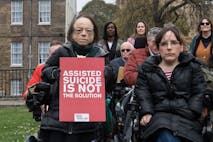
Christian college allows pro-life club after resolving 'misunderstanding'
Bridget Sielicki
·
Abortion advocates push for legalized abortion through 14 weeks in Colombia
Pro-abortion feminist groups are mobilizing for legalized abortion in the pro-life country of Colombia. Using the hashtag #14porColombia, abortion advocates are capitalizing on the recent legalization of abortion in Argentina, seemingly using abortion activism there as a blueprint for how to succeed in Colombia as well.
According to the 14 for Colombia website, legalizing abortion through the entirety of the first trimester is merely a fair compromise on a contentious issue, not a matter of literal life and death. “The debate on abortion in Colombia is between two irreconcilable extremes: total decriminalization and total prohibition,” the group said. “We propose an alternative that can have an impact on the public debate.”
Currently, abortion is permitted in Colombia in cases of rape, incest, an abnormality seen as “incompatible with life,” or if the woman’s life or health is at risk (click here for more on why the deliberate killing of a preborn child is never medically necessary). Both the doctor committing an illegal abortion and the woman who undergo the abortion face 16 to 54 months in prison if caught.
READ: Second trimester abortion pill experiment to target women in Colombia
“14 weeks is the reasonable time for women to go to the health system and not go to clandestine places that put their lives at risk,” the 14 for Colombia website claims. “In Colombia, around 70 women die each year from poorly performed abortions. All these deaths can be avoided with free abortion.”
Yet legal abortion is no guarantee of safety, as has been seen in the United States, and as was tragically just shown in Argentina. Watch the video below for a list of just some of the women who have died in the U.S. from legalized abortion:
Article continues below
Dear Reader,
Have you ever wanted to share the miracle of human development with little ones? Live Action is proud to present the "Baby Olivia" board book, which presents the content of Live Action's "Baby Olivia" fetal development video in a fun, new format. It's perfect for helping little minds understand the complex and beautiful process of human development in the womb.
Receive our brand new Baby Olivia board book when you give a one-time gift of $30 or more (or begin a new monthly gift of $15 or more).

María del Valle González López, one of the leaders of the pro-abortion campaign in Argentina, died after a legal abortion earlier this month. She was just 23 years old, and disturbingly, her pro-abortion allies have said nothing about her death. “If María had died from a clandestine (illegal at the time) abortion, feminists would be tearing the whole city apart, but since María died from a legal abortion and that doesn’t suit (their cause), it’s scrubbed,” pro-life activist Belén Lombardi said.
Also like in Argentina, it seems that many organizations outside Colombia are coalescing to push for abortion’s legalization.
Catholics for Choice, for example, tweeted an infographic with five reasons to decriminalize abortion in Colombia. Catholics for Choice is not based in Colombia, but in Washington, D.C., and has ties to Planned Parenthood and other abortion organizations. In addition to buying ads for Planned Parenthood and sending them love letters, the group’s previous president, Frances Kissling, was a founder and director of the National Abortion Federation. The Center for Reproductive Rights has likewise joined the campaign, as yet another group not based in Colombia, but in the United States.
Much of South America is ardently pro-life; for example, after Argentina legalized abortion, multiple countries publicly condemned the legislature. Yet outside abortion groups refuse to give up, with the Dominican Republic and Ecuador also in the crosshairs of the now-emboldened abortion activists. Yet as recently as last year, abortion laws in Colombia were upheld. It is the hope of pro-lifers that Colombian legislators will not bow to outside pressure, and continue to stand for life.
“Like” Live Action News on Facebook for more pro-life news and commentary!
Live Action News is pro-life news and commentary from a pro-life perspective.
Contact editor@liveaction.org for questions, corrections, or if you are seeking permission to reprint any Live Action News content.
Guest Articles: To submit a guest article to Live Action News, email editor@liveaction.org with an attached Word document of 800-1000 words. Please also attach any photos relevant to your submission if applicable. If your submission is accepted for publication, you will be notified within three weeks. Guest articles are not compensated (see our Open License Agreement). Thank you for your interest in Live Action News!

Bridget Sielicki
·
International
Angeline Tan
·
International
Cassy Cooke
·
International
Cassy Cooke
·
International
Bridget Sielicki
·
International
Angeline Tan
·
Analysis
Cassy Cooke
·
International
Cassy Cooke
·
International
Cassy Cooke
·
Politics
Cassy Cooke
·
Pop Culture
Cassy Cooke
·